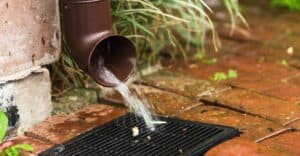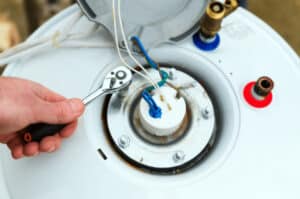The septic tank is one of the most important plumbing installations in any home. The septic tank is used to hold and discharge all the waste that flows through your drainage and sewer pipes. The septic tank is used when the house is not connected to a municipal sewer line to clear out waste into a drain field in an eco-friendly way. The Environmental Protection Agency (EPA) reports that around 25% of all American homes have a septic tank. Basically, a septic tank is connected to the main drainage or sewer line that carries all waste from your house. The septic tank is usually installed below the ground and it usually features an outlet pipe for draining the waste from the tank to a drain field. In most cases, the solid waste is allowed to settle at the bottom of the tank while the liquid nutrient-rich waste is emptied into an adjoining drain filed. This liquid waste is absorbed by the soil and all harmful microorganisms naturally filtered before it hits the water table. Some people add some chemicals in their septic tanks to help process or break down the solid waste but some experts refute the effectiveness of such chemicals. Anyway, as you can see, a septic tank plays an integral role in waste disposal at home. That is why you should always observe the following care and maintenance tips for your private septic tank.
Proper Flushing Habits
In order to ensure the smooth drainage of all waste from your house to the septic tank, you should adopt proper waste disposal habits at home. This means that you should never flush anything in your toilet except tissue paper and human waste. This helps prevent drainage and sewer clogs that can cause sewer backups in your home. You should also avoid dumping fat and grease in your sinks and human hair in your shower drains. This is another preemptive measure to prevent clogs in your plumbing system. And last but not least, you should always avoid dumping or using any harmful chemicals in your drainage and sewer pipes and also in your septic tank. As mentioned above, the septic tank should drain all the waste in your home into the soil in an eco-friendly way without any hazardous chemicals.
Install Quality Drainage And Sewer Pipes
In order to ensure the functionality and longevity of your sewer system and septic tank, you should install high quality drainage and sewer lines. You should also install a high quality septic tank. These high quality plumbing installations will ensure that the waste flows smoothly from your house to the septic tank without frequent leaks or malfunctions.
Regular Inspection And Proper Maintenance
You should have your septic tank inspected and maintained by a professional plumber on a regular basis. Hire a plumber who specializes in this kind of San Diego plumbing service. This means that you should hire a sewer line specialist to inspect and maintain your septic tank regularly.
Conserve Water In The House
And lastly, you should always avoid water wastage in your home if you wish to maintain an excellent plumbing system. Water conservation will help maintain the health of your septic tank because it eliminates water shortages. You should therefore adopt various water-saving tactics, like installing low-flow fixtures and water-efficient appliances, in your

.svg)

